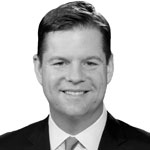Our country’s reputation around the world has taken a severe hit with the election of Donald Trump. His actions, words, and demeanor during his short time in office have caused many of our international friends and partners to question our country’s commitment to agreements, customs, and our shared American values we all hold dear. Any American who has traveled abroad in 2017 has felt the brunt of these feelings.
Aside from other international gaffes, perhaps most damaging has been Trump’s unilateral announcement that the United States was reneging on its commitment to fight climate change through the historic Paris Agreement. It boggles my mind, and the recent devastating hurricanes are poignant reminders of an environmental future we are collectively facing. As I write this column at the end of September, Trump seems to be more concerned about NFL players protesting racial injustice and police brutality than helping American citizens who are recovering from the aftermath of these historic hurricanes and floods.
While Trump seeks to further divide us and alienate our international friends and partners, it falls to the rest of us to find issues, causes, and reasons to bring people together, particularly on the international stage. If Washington will not represent America the way that it should, then it is up to cities like San Francisco across the country to show that Trump and his words and policies do not speak for all us.
As a native San Franciscan now in public office for over six years, whose mother was born and raised in Germany, I have seen firsthand the value of strong relationships and ties to people and governments in other countries across the world. For San Francisco, sister-city relationships are the primary way to manifest these bonds with other countries: they are formal government agreements that commit cities to explore social, financial, and cultural ties between our residents, and are driven by citizen volunteers.
With this background, for the past few years, I have been working diligently with the help of some amazing volunteers to create San Francisco’s first sister-city partnership in Germany.
It started with a conversation with my cousin in Germany, then the German consul general in San Francisco, and finally with Mayor Lee to begin the groundwork necessary to form this new relationship.
Over the past three years, I helped arrange four formal trips to San Francisco for the German delegation to exchange ideas about a variety of city programs, policies, services, and opportunities, and personally traveled to Germany in 2016. Volunteer citizens in both San Francisco and Germany, including government officials, have spent countless hours working to develop what they hope to learn, share, and experience together.
Ultimately the city in Germany we chose was Kiel – located in the northern part of Germany near the Danish border. Delegations from Kiel visited senior officials at the San Francisco Public Utilities Commission to discuss how San Francisco could learn from Kiel’s international leadership in producing wind energy (through wind turbines alone, Kiel’s German province produces over 100 percent of the energy consumed by all of its residents), met with local university and high school representatives to discuss establishing student exchanges between the two cities; and met with senior San Francisco Municipal Transit Agency officials to discuss the rollout of new Muni trains produced by Siemens in Germany.
Both cities have so much in common ranging from our coastal locations to our strong sailing communities, and so much to learn from each other. Germany is one of San Francisco’s largest overseas markets for tourism, and an important trade and investment partner – Kiel is a large part of this commerce, given its status as one of the largest ports in the world.
Together with Mayor Lee and a San Francisco delegation of approximately 40 residents, we traveled to Kiel during the third week of September, and officially signed the sister-city agreement. The relationship was such an important event to Kiel that they allowed San Francisco government officials to address their city council and mayor, an event that has never been granted to a non-German entity during their long history.
Creating this sister-city relationship has been one of the most unique experiences I have had in office. International efforts will never supersede the daily issues we face in San Francisco, but they are important. Politics today are highlighted by people tearing each other apart. With this project, we put significant effort into bringing people together, reminding ourselves there is more that unites us than divides us, and we have created a path for our residents to benefit from the growing ties between our cities.
If you have any questions about our new sister-city relationship with Kiel or want to get involved with the other San Franciscans already entrenched in the effort, please let me know, as we have only just begun to explore the depths of this new relationship.





